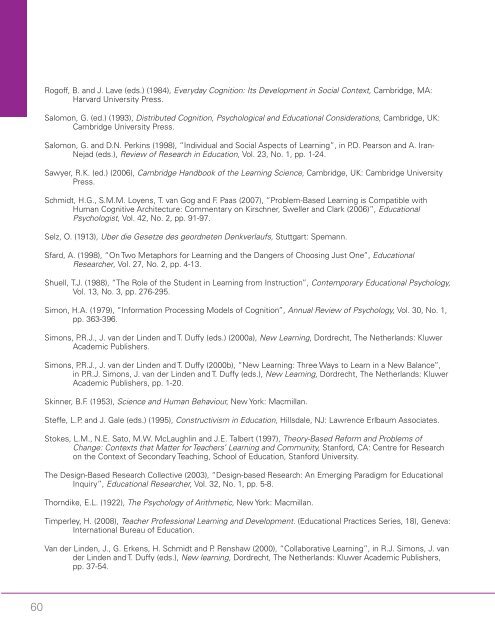del aprendizaje
s0eH3032Q2U
s0eH3032Q2U
You also want an ePaper? Increase the reach of your titles
YUMPU automatically turns print PDFs into web optimized ePapers that Google loves.
Rogoff, B. and J. Lave (eds.) (1984), Everyday Cognition: Its Development in Social Context, Cambridge, MA:<br />
Harvard University Press.<br />
Salomon, G. (ed.) (1993), Distributed Cognition, Psychological and Educational Considerations, Cambridge, UK:<br />
Cambridge University Press.<br />
Salomon, G. and D.N. Perkins (1998), “Individual and Social Aspects of Learning”, in P.D. Pearson and A. Iran-<br />
Nejad (eds.), Review of Research in Education, Vol. 23, No. 1, pp. 1-24.<br />
Sawyer, R.K. (ed.) (2006), Cambridge Handbook of the Learning Science, Cambridge, UK: Cambridge University<br />
Press.<br />
Schmidt, H.G., S.M.M. Loyens, T. van Gog and F. Paas (2007), “Problem-Based Learning is Compatible with<br />
Human Cognitive Architecture: Commentary on Kirschner, Sweller and Clark (2006)”, Educational<br />
Psychologist, Vol. 42, No. 2, pp. 91-97.<br />
Selz, O. (1913), Uber die Gesetze des geordneten Denkverlaufs, Stuttgart: Spemann.<br />
Sfard, A. (1998), “On Two Metaphors for Learning and the Dangers of Choosing Just One”, Educational<br />
Researcher, Vol. 27, No. 2, pp. 4-13.<br />
Shuell, T.J. (1988), “The Role of the Student in Learning from Instruction”, Contemporary Educational Psychology,<br />
Vol. 13, No. 3, pp. 276-295.<br />
Simon, H.A. (1979), “Information Processing Mo<strong>del</strong>s of Cognition”, Annual Review of Psychology, Vol. 30, No. 1,<br />
pp. 363-396.<br />
Simons, P.R.J., J. van der Linden and T. Duffy (eds.) (2000a), New Learning, Dordrecht, The Netherlands: Kluwer<br />
Academic Publishers.<br />
Simons, P.R.J., J. van der Linden and T. Duffy (2000b), “New Learning: Three Ways to Learn in a New Balance”,<br />
in P.R.J. Simons, J. van der Linden and T. Duffy (eds.), New Learning, Dordrecht, The Netherlands: Kluwer<br />
Academic Publishers, pp. 1-20.<br />
Skinner, B.F. (1953), Science and Human Behaviour, New York: Macmillan.<br />
Steffe, L.P. and J. Gale (eds.) (1995), Constructivism in Education, Hillsdale, NJ: Lawrence Erlbaum Associates.<br />
Stokes, L.M., N.E. Sato, M.W. McLaughlin and J.E. Talbert (1997), Theory-Based Reform and Problems of<br />
Change: Contexts that Matter for Teachers’ Learning and Community, Stanford, CA: Centre for Research<br />
on the Context of Secondary Teaching, School of Education, Stanford University.<br />
The Design-Based Research Collective (2003), “Design-based Research: An Emerging Paradigm for Educational<br />
Inquiry”, Educational Researcher, Vol. 32, No. 1, pp. 5-8.<br />
Thorndike, E.L. (1922), The Psychology of Arithmetic, New York: Macmillan.<br />
Timperley, H. (2008), Teacher Professional Learning and Development. (Educational Practices Series, 18), Geneva:<br />
International Bureau of Education.<br />
Van der Linden, J., G. Erkens, H. Schmidt and P. Renshaw (2000), “Collaborative Learning”, in R.J. Simons, J. van<br />
der Linden and T. Duffy (eds.), New learning, Dordrecht, The Netherlands: Kluwer Academic Publishers,<br />
pp. 37-54.<br />
60


